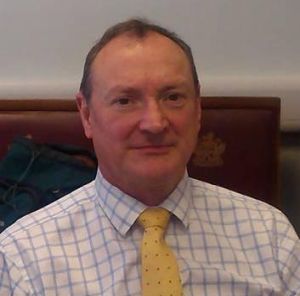6 AUGUST 2018
YOUR WORDS
Readers are invited to add their comments to any story. Click on the article to see and add.
BTN DISTRIBUTION
BTN also goes out by email every Sunday night at midnight (UK time). To view this edition click here.
The Business Travel News
PO Box 758
Edgware HA8 4QF
United Kingdom
info@btnews.co.uk
© 2022 Business Travel News Ltd.
Article from BTNews 6 AUGUST 2018
ON THE SOAPBOX: R. Nigel Johnstone - Chairman Air Safety Group
Nigel is an aviation consultant and flight operations auditor with over 35 years of experience in commercial aviation with both passenger and cargo airlines. He specialises in flight operations support, operational control and supervision. He is the holder of an FAA Part 65 Flight Dispatcher licence and an aviation safety advisor to the PACTS (Parliamentary Council for Transportation Safety) and an independent expert to European Aviation Safety Agency (EASA).  “Commercial aviation has an enviable reputation for safety and is frequently held up as an example to aspire to. That reputation has been hard won; coming from the efforts of aviation professionals spending decades learning from incidents and accidents that have befallen the industry.
“Commercial aviation has an enviable reputation for safety and is frequently held up as an example to aspire to. That reputation has been hard won; coming from the efforts of aviation professionals spending decades learning from incidents and accidents that have befallen the industry.
In 1964 a group of engineers banded together to campaign against the use of highly flammable, ‘wide-cut’ jet fuels in public transport aircraft after some high profile and deadly post-crash fires. From this, The Air Safety Group was formed.
However, the industry’s reputation is not guaranteed. Never before has it been under greater threat from relentless commercial pressure and radical changes to the regulatory environment.
As a group of voluntary front-line aviation professionals, we feel the effects of this relentless pressure. Airlines always claim that safety is their priority but is that true? We have our doubts.
Crews are working harder than ever. The Flight Time Limitations schemes which dictate how long crews can be on duty for have been relaxed. The UK’s own scientifically based scheme (CAP371) has been replaced by a pan-European scheme devised by EASA. Scientific advice was disregarded and airlines had a significant input into the new rules. Under CAP371, fatigue was almost unheard of. Yet now, 40% of pilots consider that fatigue is the single greatest threat to flight safety. The scheme limits are now seen as targets by airline rostering departments as they squeeze productivity from crews; you wouldn’t drive your car on the ‘red line’ every day yet crews now work to the limits of human endurance regularly. A research paper published this year cited that 20% of UK pilots are in a state of clinical burnout.
The days of airline sponsored pilot training are gone. Aspirant pilots now must find £120k+ without student loans or tax relief available. It can be similar for trainee air traffic controllers. How can the industry attract the best people if the primary qualification is ability to pay over ability to do the job?
Air traffic control is under increasing pressure; many units struggle to recruit and retain people. Staff shortages put more pressure on those who remain. We’ve seen overnight closures of major airfields when sickness has occurred and there’s nobody else available.
Maintenance is in a worrying state with outsourcing common. Licenced engineers and technicians are often expected to work excessive hours and accept insecure contacts. We’ve been told that raising safety concerns can result in contracts being terminated. Companies carry minimal spares to save having capital tied up; consequently, aircraft defects are not rectified promptly which adds further to crew workload.
Contracting is not only commonplace in engineering. Fifteen percent of European pilots are not directly employed; in low-cost carriers ‘atypical’ employment can exceed 50% and 40% of young pilots are employed atypically. Worse still, some new pilots must enter into ‘pay to fly’ schemes to gain experience; the most expensive seat on the aircraft is the first officer’s! There is no paid leave or sick pay; some debt laden pilots report for work unfit through fatigue or sickness. Pilots with insecure employment also express concern about reporting safety issues.
Soon airlines will be encouraged to fly with much less fuel than they currently carry when a new EASA fuel schemes are passed into law. In the USA, airlines have been flying with far less fuel than European carries for over half a century. The FAA require that all flights especially those carrying lower fuel reserves undergo a risk assessment by a fully qualified and licensed Flight Dispatcher before an authority to fly is granted. In Europe there will be no such strategic or tactical scrutiny, the burden for which will be added to pilots already heavy workload.
Be under no illusion, we are seeing unprecedented profits, yet the cost drive is relentless. Passengers are accustomed to cheap tickets but in reality, you can’t fly across a continent for €10. If ticket prices don’t cover the true cost then someone else is paying; today, it is frequently the professionals in whom we entrust our lives.
Where is the regulator? Organisational Safety Management Systems are the vogue and regulators use Performance Based Oversight to reduce costs (a familiar theme) as they focus efforts on organisations deemed to pose the highest risk; to insiders, PBO is colloquially called light-touch or self-regulation yet myriad corporate scandals have shown companies cannot always be trusted when profits are involved and nobody is watching. What if safety was not their priority?
The industry is not healthy. The Air Safety Group’s work is essential and onerous.
https://airsafetygroup.org
OUR READERS' FINEST WORDS (All times and dates are GMT)
All comments are filtered to exclude any excesses but the Editor does not have to agree with what is being said. 100 words maximum
